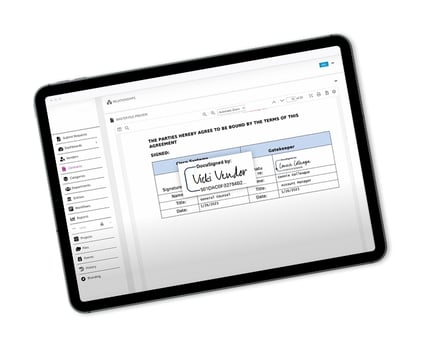

Electronic signatures - sometimes referred to as digital signatures - have long been used within the contract management process. Using this method, as opposed to the traditional wet signature, has allowed many businesses to:
While these benefits are suitable for all types of businesses, the nature of a business will determine which type of digital signature can be used.
The eSign solution from Gatekeeper, via its DocuSign integration, can now support all types of businesses and their QES requirements. In this article, we’ll take a deeper look at how companies within regulated industries, such as Biotechnology, can use our native eSign solution to safeguard compliance.
Not all electronic or digital signatures are designed equally. While all variations are as legally binding as a handwritten signature, different types of digital signatures serve different purposes. Let’s take a look below.
Qualified Electronic Signatures are important for businesses within regulated industries that are faced with different signing requirements.
Businesses working in the financial sector, healthcare and biotechnology need to comply with regulations such as: The eIDAS Regulation (EU) 910/2014 and UK eIDAS - a version of the EU regulation that was modified post-Brexit.
Qualified Electronic Signatures use cryptographic technology to provide a unique digital identifier for the signer and to ensure that the signed document has not been altered or tampered with.
This helps to prove the authenticity of a signed document and to determine that no modifications have been made since it was signed. QES also has legal validity equal to a handwritten signature, making it enforceable across many countries.
The use cases for this type of signature include sensitive health information such as personal health details, financial data and government records.
Gatekeeper integrates with DocuSign, allowing you to choose the signature that best suits your requirements.
This integration allows businesses within Biotechnology, Healthcare, Software and Finance to use QES and comply with industry regulations. Whether your business chooses to use our native eSign or DocuSign, a comprehensive audit trail is recorded within Gatekeeper.
 Use DocuSign within Gatekeeper
Use DocuSign within Gatekeeper
If you’re looking for a new way to sign contracts, want to safeguard compliance or want the benefits of Vendor and Contract Lifecycle Management whilst using DocuSign, book a demo now.
Ready to improve your contract & vendor management?
.png)
.png)
.png)
-4.png)
Before Gatekeeper, our contracts
Anastasiia Sergeeva, Legal Operations Manager, BlaBlaCar
were everywhere and nowhere.
Gatekeeper is that friendly tap on the shoulder,
Donna Roccoforte, Paralegal, Hakkasan Group
to remind me what needs our attention.
Great System. Vetted over 25 other systems
Randall S. Wood, Associate Corporate Counsel, Cricut
and Gatekeeper rose to the top.
Thank you for requesting your demo.
Next Step - Book a Call
Please book a convenient time for a quick call to discuss your requirements.